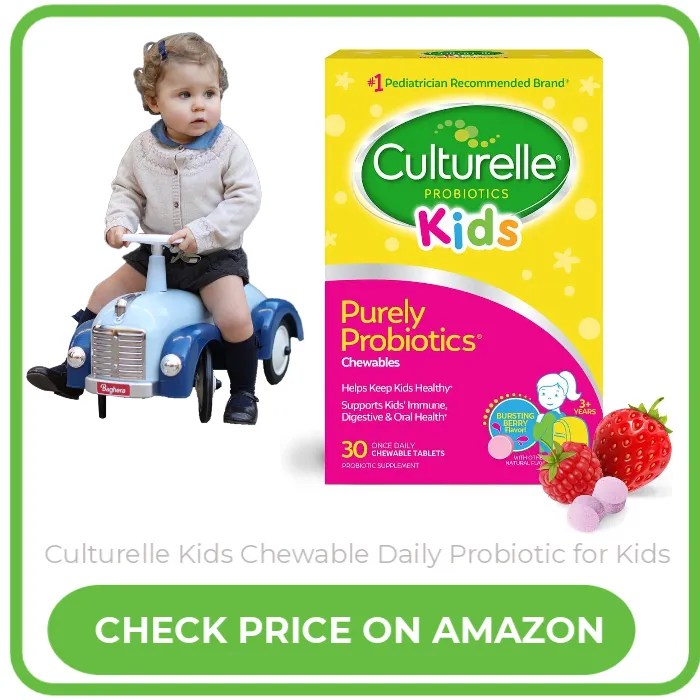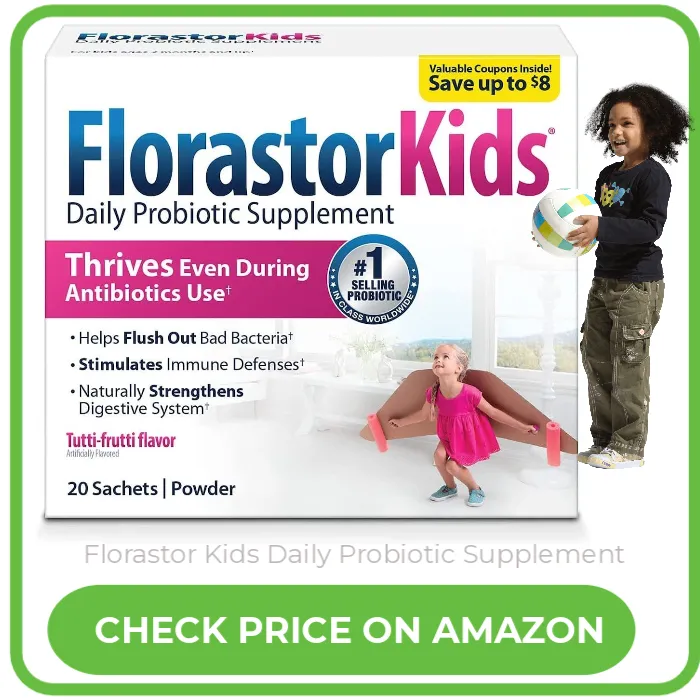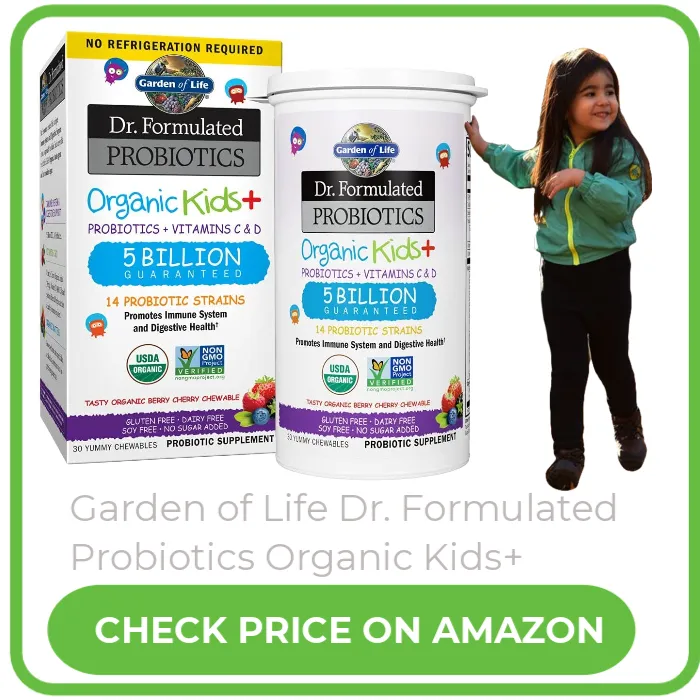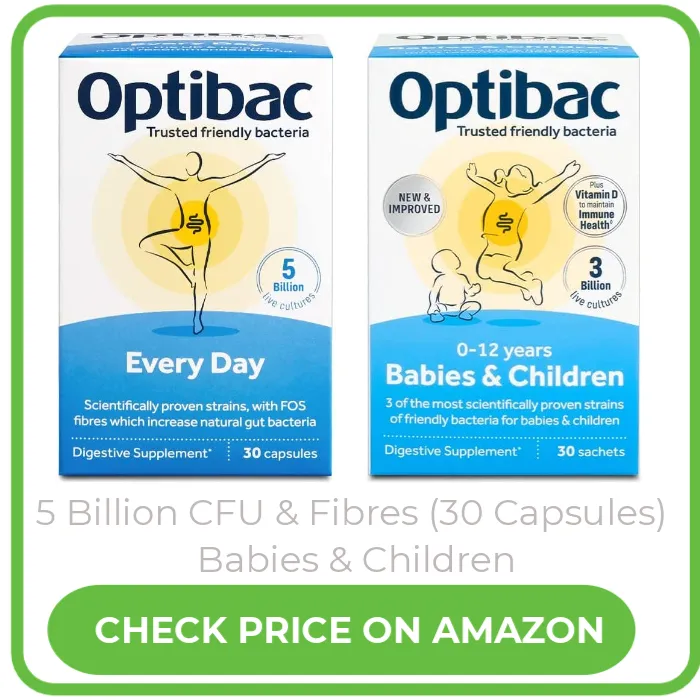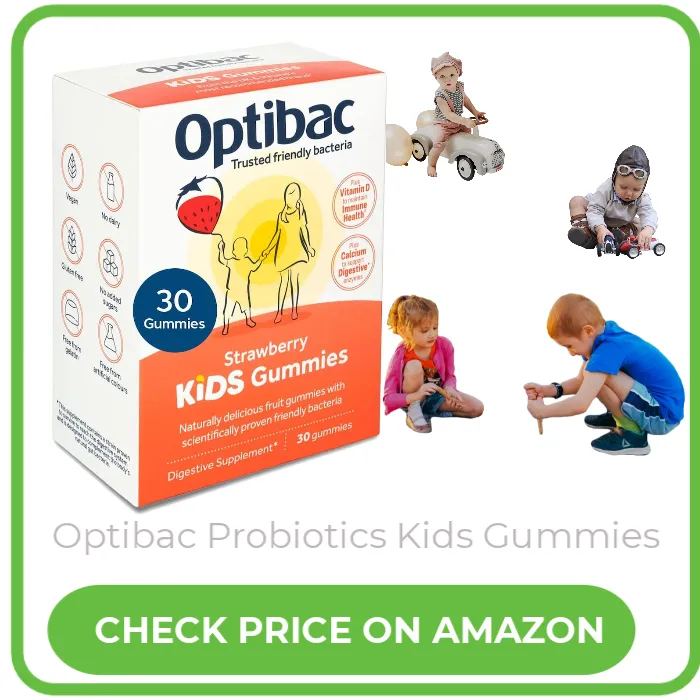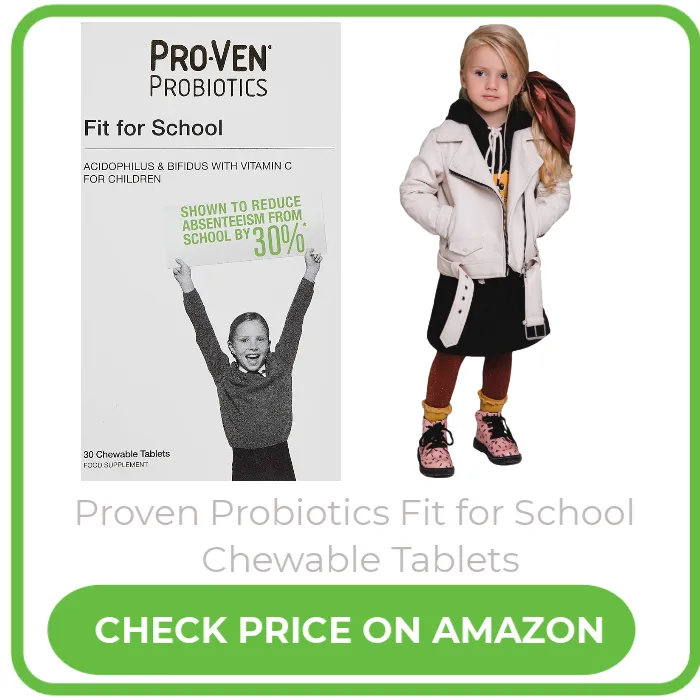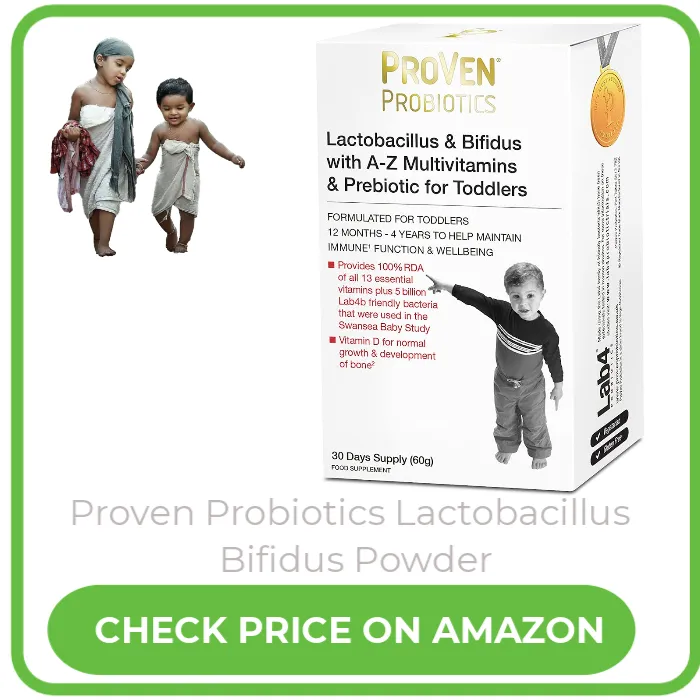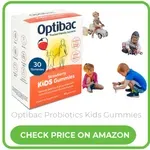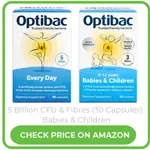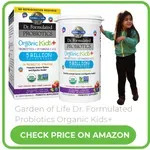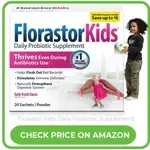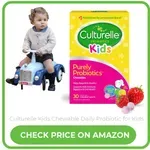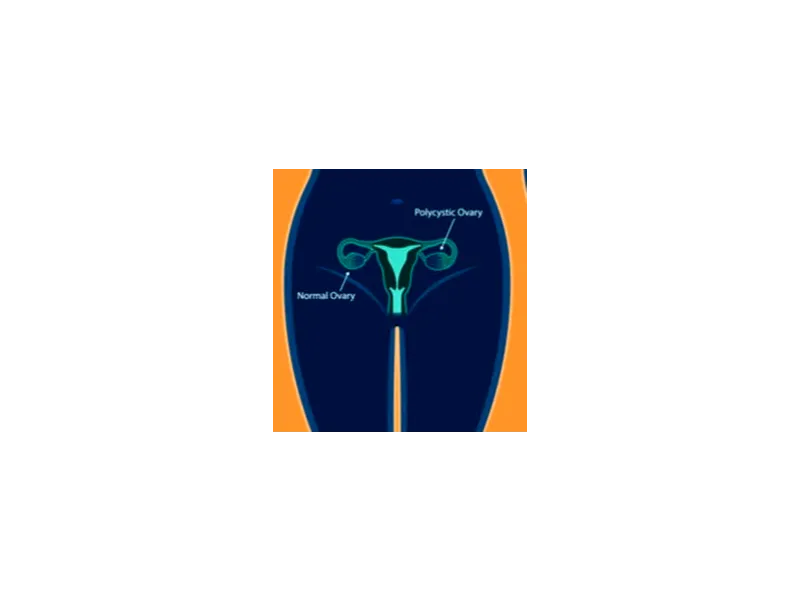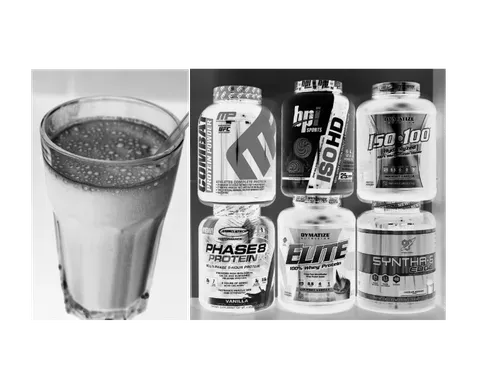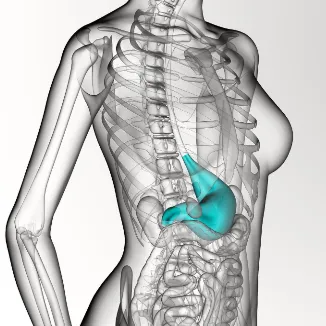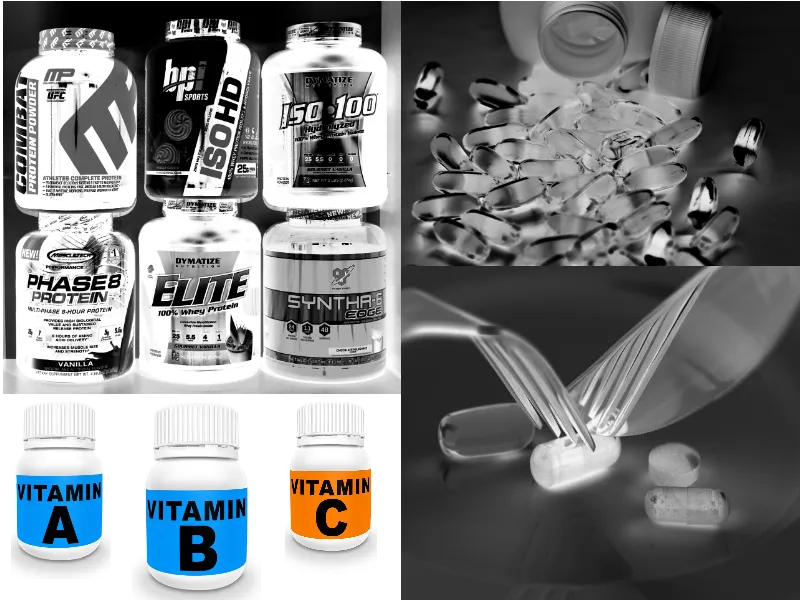Probiotics For Kids
Best Probiotics for Kids 2023
Truth About The Best Probiotics for kids (You're gonna want to know this!)
We've scoured the internet and sourced dozens of products to find the ones that really make a positive difference.
If you're thinking about adding probiotics to your baby’s diet, here are the most important things you need to know.
It’s important to note that the American Academy of Pediatrics (AAP) does not recommend that parents introduce probiotics to their babies until 6 months old, but some experts believe that it is beneficial as soon as the first tooth erupts.
Probiotics are often used to support the development of a healthy immune system in babies. When a child is born, the immune system is not fully developed. As a result, the immune system is not able to recognize and react to harmless organisms and germs.
Because of this, babies are vulnerable to illnesses caused by organisms and viruses. In addition, many of the infections and illnesses a baby might encounter in the first year of life are preventable by probiotics.
How We Choose The Best For You
As mentioned, the AAP does not recommend introducing probiotics until around six months of age. This is because most children have established a healthy immune system by then.
However, most infants and toddlers have yet to develop a healthy immune system. If you are considering introducing probiotics to your baby, we're here to help.
We've done the research for you. After reading thousands of reviews on Amazon, our team of vitamin experts has compiled a list of the top 5 probiotics for babies.
We've read through & researched countless reviews on Amazon and other Authoritative Sources and Researched Data to find some of the best of the best probiotic supplements for babies.
These Top 7 make our Top Selection List:
How we choose:
We've read through & researched countless reviews on Amazon and other Authoritative Sources and Researched Data to find some of the best of the best Acid Reflux supplements for immune support, muscle strength, muscle recovery, athletic endurance and sleep.
Why Culturelle Kids
Made Our Best of The Best Top 7 & Why we love it
It is helpful & reassuring to know
Lactobacillus rhamnosus GG, a clinically studied probiotic strain that helps balance intestinal bacteria, helps get your child’s digestive system back on track and minimises discomfort.
Why Florastor Kids Daily Probiotic
Made Our Best of The Best Top 7 & Why we love it
It is helpful & reassuring to know
Florastor is one of the most popular probiotics on the market today. It’s the #1 probiotic in its class around the world and is made with natural, healthy and effective ingredients that are vegetarian, gluten-free, titanium dioxide free, and appropriate for lactose intolerance.
Why Garden of Life Dr Formulated Probiotics
Made Our Best of The Best Top 7 & Why we love it
It is helpful & reassuring to know
Why Optibac Probiotics Family Bundle
Made Our Best of The Best Top 7 & Why we love it
It is helpful & reassuring to know
The best probiotics for babies & children is scientifically proven to reach the gut alive, with a guarantee of at least 3 billion viable bacteria in every sachet, plus Vitamin D3, and a full range of beneficial probiotic strains.
Why Optibac Probiotics Kids Gummies
Made Our Best of The Best Top 7 & Why we love it
This strawberry-flavoured probiotic is specially designed for children from 6 months to 5 years, and has been proven to help support a healthy digestive tract with a range of great tasting, chewable benefits.
It is helpful & reassuring to know
Why Proven Probiotics Fit for School Made Our Best of The Best Top 7 & Why we love it
This probiotic is for children aged between 4 and 16 years. It has 12.5 billion Lab4 friendly bacteria and a vitamin C booster. It helps keep children well at school, which means less sick days for the whole family. It’s suitable for vegetarians and vegans.
The Proven Probiotics Fit for School Chewable Tablets are specially designed to support the development of your child’s immune system. These tablets contain 12.5 billion live LAB4 friendly bacteria, plus 100 mg of vitamin C to support your child’s immune function.
It is helpful & reassuring to know
Proven Probiotics is specially formulated for children aged between 4 and 16 years. It contains the friendly bacteria called Lab4 (which may help to prevent respiratory tract infections). In addition, it contains vitamin C, which may help to prevent respiratory tract infections in the short term.
Why Proven Probiotics Lactobacillus & Bifidus Powder Made Our Best of The Best Top 7 & Why we love it
Proven probiotics, one of the only probiotic with a multivitamin specifically designed for babies and children aged 12 months to 4 years old. 5 billion friendly bacteria plus the child's daily requirement of all essential vitamins. 30 day supply.
It is helpful & reassuring to know
Knowledge Base:
Baby Probiotic
Best Baby Probiotics
Colic
Toddler
Reflux
Probiotic for Babies
Best Probiotics for Babies
Babies and Toddlers
Probiotics for Kids
Colic and Reflux
Baby Probiotic
Probiotics Help
Probiotic Drops
Best Baby Probiotics
Colic
Give Your Baby
Toddler
Reflux
Probiotic Supplement
Probiotics for Kids
Liquid Probiotic
Garden of Life Baby Probiotics
Give Probiotics
Bliss Probiotic Drops
Probiotic Powder
Garden of Life
Lovebug Tiny Tummies Probiotic
Probiotics Help with Colic
Infant
Probiotic Strain
Probiotic for Babies
Best Probiotics for Babies
Gut Microbiome
Colic and Reflux
Give Your Baby a Probiotic
Probiotic Products
Best Probiotics for Kids
Types of Probiotics
Acid Reflux
Give Your Baby Probiotics
Help Babies
Baby Probiotic Drops
Probiotics for Babies with Colic
Side Effects of Probiotic Supplements
Probiotics Make a Difference
Some first things you should consider:
The first thing you should consider when choosing a probiotic supplement for your baby is how they’ve been formulated. A lot of companies take advantage of the fact that babies are still developing. They focus their research and development around formulas that provide the right amounts of the specific strains of organisms that are believed to help the baby develop.
It’s important to remember that probiotics are not the same as prebiotics. Prebiotics are a food source for probiotics. Good prebiotics are things like lactose-free milk, fruits, vegetables, and grains. Good probiotics will happily consume prebiotics, but they’ll also eat other types of foods.
If you’re looking for a product that’s been well researched and is clinically proven to work, you can look at our list of the best probiotics for babies and infants.
Another thing you should consider when choosing a probiotic supplement for your baby is if there are any contraindications for your child. Commonly used medications such as antibiotics, antacids, or NSAIDs are some of the biggest concerns with giving probiotics to your baby. If you have a child that has a history of digestive issues or allergies, a probiotic supplement may not be the best choice.
You need to think about the type of probiotic you are going to use. Some are more beneficial for babies than others. One of the most common probiotic supplements is Bifidobacteria Infantis.
You need to answer the question, what you’re looking for in a probiotic? Many parents are looking for natural remedies to help support a baby’s immune system, while others are seeking to provide gut health benefits.
Probiotics can come in many forms, and each form offers unique benefits. Some are capsules and powders, while others are liquids or drinks. One of the most common forms of probiotic is the liquid variety. Liquid probiotics are easily consumed by a baby.
Some people think that a bottle of probiotics with a picture of a happy infant on the label is a good way to entice a mommy to purchase the product. While the label may be attractive, it does little to prove that the product is effective.
If you’re looking for a quick fix, then you might be interested in buying a bottle of probiotics. However, if you are looking for something that supports gut health, then it’s worth doing some research to find the right kind of probiotic, which is why you are here.
FAQ
What type of probiotic is best for infants?
There are many different types of probiotics, and it can be difficult to determine which one is best for infants. However, some research suggests that Lactobacillus rhamnosus GG (LGG) and Bifidobacterium animalis subsp. lactis BB-12 (BB-12) may be the most effective options. Probiotics are live microorganisms that are thought to provide health benefits when consumed. They are found in many foods, including yogurt, sauerkraut, and kimchi, as well as in supplements.
However, not all probiotics are created equal. This article will explore some of the characteristics of these two popular probiotics and discuss whether they should be used with infants. Probiotic Characteristics In general, probiotics are thought to improve gastrointestinal health. They are believed to support a healthy immune system, help control allergies, and reduce the risk of diarrhea and respiratory infections. For infants, they are often recommended as an alternative to antibiotics. LGG is one of the most common strains of probiotics available.
Are probiotic supplements good for babies?
You may already know that probiotics are beneficial to your well-being, but did you know that probiotics are also good for your baby’s health?
Probiotics are helpful in preventing and treating diarrhoea, antibiotic-associated diarrhoea, necrotizing enterocolitis (NEC), and other gastrointestinal problems in infants.
However, there are many types of probiotics available on the market, and not all are safe or effective for babies.
Many times parents are told to use a certain probiotic formula, or supplement, as their child’s first line of defence against common infant health issues. This is not always the case.
As a parent, you need to educate yourself and know exactly which type of probiotic is best for your baby.
Here are four things to consider when choosing a probiotic supplement for your baby:
1. What is the exact formulation of the probiotic?
2. Does the probiotic contain an antibiotic?
3. Is the probiotic live or freeze-dried?
4. How long has the probiotic been on the market?
Probiotics are generally thought to be beneficial for children and adults alike, and that includes babies. Studies show that the health benefits of probiotics can include supporting the immune system, improving gastrointestinal function, and reducing the risk of allergies and asthma.
However, there are some things to consider before adding probiotics to your baby’s diet. A recent survey by the American Academy of Pediatrics found that almost half of parents surveyed used probiotic supplements for their babies. And although probiotics are generally considered safe, some can cause diarrhoea, gas, and stomach cramps in young children.
Can I give my baby probiotics?
You probably know that probiotics are beneficial for your gut. They help to promote good organisms in your digestive tract and provide your body with immune system support while helping to prevent the growth of pathogenic organisms.
However, a number of recent studies suggest that probiotic supplementation may also be beneficial for your baby. Some research suggests that probiotics could be useful in treating conditions such as eczema, respiratory infections, colic and diarrhoea.
Is it OK to give baby probiotics every day?
It's natural for us to want to offer our children the best health care possible. Baby probiotics contain beneficial bacteria that can promote healthy digestion and brain development. This helps them to build strong immune systems, which will allow them to fight off infections and disease. Giving probiotics to babies can improve their digestive system and strengthen their immune systems.
A lot of parents ask themselves this question and are confused by conflicting advice on whether or not they should give their babies probiotics. It is always a good idea to follow the advice of experts who have been studying probiotics for a long time. Experts recommend giving probiotics at birth and continuing through the first year of life.
There is evidence that shows that giving a daily dose of probiotics from the moment you give birth protects the newborn from respiratory infections. Experts recommend giving probiotics during pregnancy and continuing after the child is born. The benefits of giving probiotics include protecting your baby against allergies, boosting the immune system and reducing the risk of asthma.
Are all baby probiotics the same?
No, there are two types of probiotics for babies: natural and artificial. Natural probiotics are usually found in breast milk. Artificial probiotics are designed specifically to work with infant formulas and are not recommended to be used with breast milk.
All baby probiotics are meant to help the infant get healthy faster. They can all work in different ways, but the main purpose is to help the digestive system develop. The main difference between baby probiotics is that they contain different doses of nutrients. They can all work to support the digestive system of the baby, but the main ingredient in a baby probiotic is the amount of Bifidobacterium bacteria.
Is gripe water a probiotic?
You might want to keep your fridge or pantry stocked with a wide variety of foods to ensure you always have something healthy to eat, but if you’re looking for the most convenient option for your daily meal routine, then you may want to try a new trend called gripe water. GRIPE water is basically a drink made from fermented fruit or vegetables, and it’s considered to be the easiest, most affordable, and healthiest way to get a daily dose of probiotics without spending a fortune.
Can I give my baby gripe water and probiotics?
You can make homemade probiotic and gripe water for your baby, but the best option is to buy probiotics and gripe water that you know is made of quality ingredients. Probiotics are bacteria that live in the intestines and helps your immune system, digestion and overall health. Probiotics also reduce gas and boost digestion. If you have a baby who is suffering from diarrhea, you can mix probiotics with gripe water to improve symptoms. You can find gripe water online or at a local store that sells natural remedies.
What age can babies take probiotics?
According to the American Academy of Pediatrics, you can start introducing probiotics to babies at the age of six months. They advise that you give babies at least three grams of live bacteria daily. You can introduce them through foods like yogurt and cereals. However, you should make sure to use the right strain of bacteria, which is only found in fermented foods. You need to choose a probiotic with high levels of Lactobacillus and Bifidobacterium. These two strains are responsible for healthy digestion.
Most people take probiotics for their children after the first year of life. The most important time for a baby to take probiotics is during the first year of life. This is when they start producing their own friendly bacteria. When you introduce a healthy probiotic supplement into a baby’s diet, they don’t even know it!
The human body contains 10 trillion cells, and 90 percent of them are bacterial cells. These bacteria are vital for health, and they need to be given the chance to populate. The bacteria will multiply, creating trillions of good bacteria that will stay with the child until adulthood. As they get older, they can take probiotics on their own.
Can you give a 1 month old baby probiotics?
There are no specific guidelines for the amount of probiotics that babies need. Babies start producing their own microbes at birth. As long as they are breastfed exclusively, their body is able to produce the appropriate bacteria that will grow into a healthy microbiome.
The baby’s environment is one of the factors that influence the growth of their microbiome. As soon as children begin to eat solid foods, they should be introduced to a wide range of different types of foods that contain probiotics.
The best way to introduce them to probiotics is through breastfeeding. Breast milk contains lots of beneficial bacteria that support the growth of probiotic bacteria. After they start eating solid foods, kids need to have enough probiotics to support their health and development.
Can probiotics make baby worse?
Yes, they can. If you are pregnant, you should avoid consuming probiotic products and other health supplements because there are some risks involved. Your body goes through a lot when you are pregnant, and you should not add any additional stress to it.
Probiotics are beneficial when used properly. However, if you have an allergic reaction to them, they can worsen your condition. There is also evidence that probiotics may be harmful to babies.
The use of probiotics during pregnancy has been associated with a higher risk of having low birth weight babies. This is because these bacteria are essential for the development of the immune system of babies.
During pregnancy, your body needs to develop in order to prepare you for the delivery of your baby. A healthy diet is one of the major ways to keep the pregnancy healthy. You should avoid alcohol consumption because it can cause fetal alcohol syndrome.
You should also avoid taking medication which is linked to birth defects. If you take antibiotics, you need to be careful about what kind of probiotics you are taking. Some antibiotics can lower the effectiveness of probiotics.
Some people are convinced that probiotic supplements are bad for babies. This idea comes from the wrong conclusion of a few studies that showed that taking probiotic supplements may cause diarrhea in kids.
However, the latest research suggests that the use of probiotics is actually beneficial to babies. This conclusion was drawn from an experiment where pregnant women were given probiotic capsules and they gave birth to healthy babies. Babies who received probiotics had higher levels of breast milk fat and omega 3 fatty acids compared to the control group.
Does a breastfed baby need probiotics?
Many parents worry about whether their newborn baby needs probiotics or not. As a rule of thumb, most babies do not need probiotics. The reason is that breastfeeding is a natural process and it is already full of good bacteria.
The main source of probiotics in our body are the foods we eat. The most important source is our digestive system. Probiotics can be found in foods like yogurt, cheese, and other dairy products. They are also found in fermented foods such as sauerkraut and kimchi. People who eat a lot of these foods tend to have a high level of probiotics in their bodies. Babies are usually given an initial course of probiotics, which will gradually decline as their diet becomes richer.
Breast milk contains beneficial bacteria, called “bifidobacteria,” which help to prevent diarrhea, and reduce the risk of infections. These bacteria thrive in the gut of a breastfed baby and are most abundant in the first few days of life.
Breastfeeding mothers who want to ensure that their babies have the optimal bacteria levels in their intestines can introduce certain foods into their diet. Probiotics, also called "good" bacteria, are one of those foods that are believed to provide health benefits. Probiotics are live bacteria that can grow and multiply in your body and support the health of your digestive system.
These bacteria help to keep the balance of good bacteria in your gut. If the bad bacteria in your gut become more numerous, your risk of getting a stomach bug, such as a cold, flu, or diarrhea, increases.
Best Probiotics For Kids Suplements
Some parents do use probiotics to boost immunity and to support digestive health. Other parents use probiotics to support the gut microbiome of their infants.
A healthy microbiome refers to the number of organisms in your body. These are the "good" bacteria that help keep your immune system healthy. A healthy microbiome also helps protect against allergies, eczema, asthma, gastrointestinal disorders, and obesity.
Probiotics are commonly consumed as dietary supplements or in a variety of items like yoghurt, fruit, and juices.
For decades, medical science has been able to point to the microbiome as the key reason behind an array of diseases and illnesses. This connection has been bolstered by recent studies, which suggest that the gut microbiome could be one of the main reasons for autoimmune diseases, diabetes, obesity, and other chronic health issues.
Since the body communicates with the brain via the gut, it makes sense that a healthy gut is a necessary part of a healthy body. When that gut is inflamed, it can send signals to the brain to cause a host of problems.
If you’re considering adding probiotics to your baby’s diet, you’ll want to research the items carefully. This is where it can be tricky to navigate, especially if you’re not sure what the difference between good and bad probiotic is, then consider the following:
What are baby probiotics, and what are the benefits?
According to Jenelle Ferry, M.D., a neonatologist and the director of feeding, nutrition and infant development at Pediatrix Medical Group of Florida., probiotics are good organisms that normally should be living in our intestines, and which begin to colonize from the time we are in the womb
“We want to keep a healthy balance of this good bacteria in our gut to out-compete the bad organisms.”
What does the research say about baby probiotics?
Lactobacillus and bifidobacterium are the two most common strains and can be found in yoghurt, as well as being available as supplements. The immune response and better digestion can be aided by the presence of probiotics in older infants and toddlers. She says that the use of probiotics can shorten the duration of gastroenteritis and help post-diarrheal illness recovery.
Better digestion, as well as the immune response, can be supported with probiotics. There are some GI illnesses that can be helped with in older infants and toddlers with the best evidence available. It's possible to shorten the duration of a disease with the help of a certain type of flora.
What the research says about baby probiotics is that they’re actually very safe. Even if you are using a probiotic supplement for your infants, the majority of infants don’t have any adverse reactions to them.
Remember that they are living organisms. The word “organism” is often used interchangeably with “bacteria” or “microbe.”
However, all of those words are describing the same organism, but they refer to the size of the organism. A bacterium is the smallest living entity that can reproduce itself. The word “probiotic” is a combination of the word “pro” meaning “for” and “biotic” meaning “life-giving.”
When talking about organisms, the most commonly referenced bacteria is “Lactobacillus acidophilus,” which is actually a unicellular organism. This microbe is naturally present in your digestive system, where it helps to break down food and synthesize vitamins.
Your digestive system is home to hundreds of species of beneficial organisms. Some of these species include Lactobacillus, Bifidobacterium, Enterococcus, Streptococcus, Escherichia coli, and Klebsiella.
Because your gut microbiota is so important to your overall health, probiotics are used to restore balance to your gut. In particular, probiotics help to balance the levels of good organisms in your gut that helps your immune system to function properly.
Probiotics also help to prevent harmful organisms from growing. When a certain bacterium enters your body, the probiotic helps to keep the bad bacteria from replicating, causing illness.
Here’s a breakdown of the most common probiotic organisms for babies:
• Lactobacillus acidophilus: This organism is generally the most popular option for probiotic for babies. It is generally recommended that mothers take this supplement after birth to help promote healthy digestion for the baby.
• Bifidobacterium lactis: This is another option for probiotics for babies. It’s one of the most effective organisms to help promote healthy digestion in babies.
• Streptococcus thermophilus: This organism is known for helping to fight colds, but it’s also used to create yogurt and cheeses. However, this organism is not typically recommended for probiotic supplementation for babies.
• Lactobacillus rhamnosus: This is another organism that is not commonly recommended for babies. It is commonly found in dairy products and is used to make yogurt.
• Enterococcus faecalis: This is a good option for a probiotic for babies that also comes in the form of a powder. It is generally found in milk.
• Lactobacillus reuteri: This is one of the most studied organisms for probiotic
If you are breastfeeding your baby, they don’t need supplements, but they will get all the nutrients they need from the breast milk. You may want to consider starting them on a probiotic supplement, which will help provide them with a healthy digestive system.
The best time to give probiotics is between birth and 4 months. The reason why is that breastmilk provides all the necessary organisms and good nutrients to babies' guts. So they have a full immune system to fight off any infections. After 4 months, your baby will get all the necessary nutrition and bacteria from the formula.
There is a lot of debate about whether or not to give probiotics to babies. Some of the concerns are that probiotics can cause diarrhoea and allergies, but there are some probiotic strains that can be beneficial. So the decision is yours to make.
What do I need to know before giving my child a probiotic?
That it’s really hard to give a general recommendation since it depends on each individual case and the different factors that affect the gut flora. However, it is clear that babies who are breastfed have healthy gut flora, so there’s no reason not to feed your baby with breast milk as the main source of nutrition.
You should also avoid bottle feeding as this can result in gut infections and bad bacteria. If you are bottle-feeding your baby then make sure that the formula you use contains lactose and Bifidobacterium cultures.
Another important factor is the use of antibiotics. Antibiotics kill good organisms, which causes gut infections.
In order to avoid these problems and get a healthy gut flora, you should choose a probiotic that contains Bifidobacterium infantis 35624. This is a bacterium that can produce short-chain fatty acids (SCFA) that are the main energy source for the human body. It also helps in the production of important molecules such as IgA, which is a kind of protein that plays a fundamental role in protecting against pathogenic microorganisms and thus preventing allergies.
It’s important to note that there are a lot of probiotic supplements on the market that claim to be better than others. But, this is not an easy thing to do as these items that are effective are usually very expensive.
Don't just blindly give probiotics to your little one. Understand what you're doing and why you are giving your child probiotics. Once you understand how it works, you'll be able to see whether your little one needs them or not.
When should my baby take a probiotic?
You might be wondering about taking probiotics for your baby. Here is some insight on the best probiotics for babies.
Probiotics are an essential component of a healthy gut microbiome. Probiotic organisms are live microorganisms that, when administered in adequate amounts, confer a health benefit on the host. The human gastrointestinal tract is colonized by trillions of organisms. A balanced intestinal microbiota is essential for a healthy immune system and digestion. A healthy gut is also essential for proper development and healthy mental health.
Your baby has an immature gut at birth and is lacking in certain key beneficial bacteria. Probiotics are living organisms that are added to foods or administered via oral drops. They provide good organisms that promote growth and development of the immune system and digestive system, help in digestion, help in the absorption of nutrients, help in the production of vitamins, and maintain the balance of the gut flora.
The most common type of probiotic used in infants is Saccharomyces boulardii. It is a non-pathogenic yeast and is usually given to infants as early as the first week of life to help protect against bacterial infections.
There are a few more things you need to consider:
First of all, it doesn’t matter if your baby takes a probiotic or not, but what matters is when they take it. Most experts agree on the best time to introduce a probiotic is in the first six months of life. While there is no official recommendation for dosage, most experts agree to give a newborn between 500-1,000 CFUs. A CFU is an amount of colony-forming units (CFUs) that are present in one millilitre of probiotic bacteria.
In other words, if your baby was given a single dose of the probiotic, this would mean one million CFUs. One CFU is a single microorganism, meaning one probiotic is made up of one million microorganisms. This is a lot!
What happens in the early stages of the gut is critical to a healthy immune system, development, and overall wellness. Babies born prematurely have an immature immune system and often receive antibiotics that destroy good organisms, which can leave them with diarrhoea and other gastrointestinal issues. When this occurs, probiotics can be used as a natural remedy to restore good bacteria levels and help your baby be more comfortable and less likely to suffer from digestive tract infections.
What’s The Baby Probiotic Supplement For You?
We hope you found this information helpful and that it will help you get the results that you sincerely seek. All you have to do now is just press the BUTTON BELOW to check the price on the best option for you , do that now.
Thank’s for stopping by. Don’t forget to Book Mark us, to easily find us again. We hope to see you soon.

